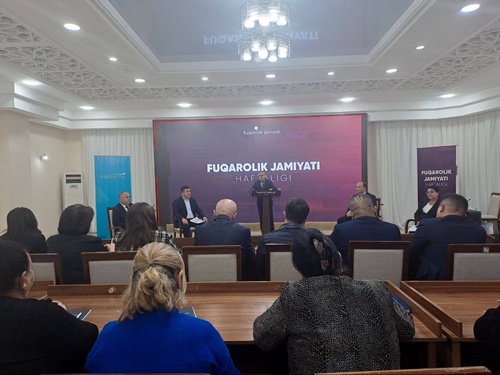Reforms cannot be implemented without collaboration with civil society institutions.
Civil society institutions complement government initiatives and serve as conduits for public oversight mechanisms. These topics were central to the speeches delivered by speakers at a meeting organized as part of Civil Society Week in the Navoi region.
The event, which took place in an open dialogue format with the Deputy Governor of the region, the Chairperson of the Regional Kengash of People's Deputies, the Deputy Head of the Justice Department, and the Chairperson of the Public Council under the Navoi Regional Hokimiyat, included local Kengash deputies, representatives of non-profit organizations, national-cultural centers of the region, and public associations.
During the meeting, discussions revolved around the establishment of a state support system for civil society institutions based on principles of transparency and healthy competition, as well as additional conditions to enhance the effectiveness of socially significant programs. This was outlined in the Presidential Decree of the Republic of Uzbekistan "On Measures for Further Improvement of the State Support System for Civil Society Institutions" dated August 24 of this year. One of the points in this document specifies the annual observance of "Civil Society Week" during the first week of December, which includes meetings and dialogues involving representatives of non-governmental non-profit organizations.
- For the first time in our country, a Concept for the Development of Civil Society for 2021-2025 has been approved to determine prospects for the near and medium-term future, along with tasks for further improving the regulatory framework that provides legal guarantees for non-governmental non-profit organizations and meets modern democratic requirements and international standards, - noted Alijon Jalilov, Chairperson of the regional branch of the National Movement "Yuksalish," in his speech. - The document sets the task of increasing the volume of state support for civil society institutions in the form of subsidies, grants, and social orders by 1.8 times by 2025, with the total allocated funds reaching 70 billion sums. Currently, non-governmental non-profit organizations in the Navoi region serve as examples for the republic in addressing real problems faced by the population, particularly in the development of local entrepreneurship and training women from remote areas in various professions. Alongside NGOs, the role of local self-governance bodies is also increasing in tackling local issues, as they propose solutions based on state grants.
Speakers during the open dialogue emphasized the need to strengthen parliamentary oversight in local Kengash when making crucial decisions concerning the social and economic development of the region. Local Kengash should become generators of ideas, initiatives, and platforms for discussions that lead to well-considered decisions. It is important to remember that society is shaped by people, activists, and those who care about the problems of their region.
Additionally, the dialogue addressed current issues in the activities of the Public Council under the Navoi Regional Hokimiyat, which was established as part of a fundamental revision of the approach to government-citizen relations to facilitate effective and efficient dialogue between the state and society, develop robust mechanisms for public oversight of government activities, and ensure transparency and openness in their operations while effectively interacting with civil society institutions. In accordance with the August decree of the head of state, the effectiveness of the Public Council's activities will be evaluated annually, with the results of this evaluation announced. Members of the Public Council include labor veterans who have served exemplary in government bodies, respected citizens with significant practical experience in public activities, as well as representatives of non-governmental non-profit organizations, media, and other civil society institutions. The importance of maintaining maximum transparency in the council's activities was emphasized.
Dilfuza Gulyamova.
